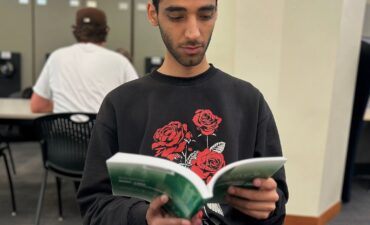Fay Munro, a university student and mother, suffered a brain injury four years ago after rolling her SUV, initiating a string of events that eventually led to a crystal meth addiction and brought her to Raising Hope.
“I came here to try to break the cycle and change my life,” said Munro. “But they are pushing me back into my old habits.
“It’s supposed to be our safe place and it’s not.”

Raising Hope Moving Families Forward, an organization within the Street Worker’s Advocacy Project (SWAP), provides housing in Regina for young mothers battling substance abuse. Multiple attempts were made to contact executive director Barb Lawrence, but she was unavailable for comment.
“The Street Worker’s Advocacy Project is an autonomous community-based organization, and they have the ability to make their own decisions on whether they wish to do an interview,” Leya Moore, manager of public relations for the Ministry of Social Services, wrote in an email.
The Saskatchewan Ministry of Social Services announced $1,575,000 for Namerind Housing Corporation to fund Raising Hope in October of 2017.
While expecting her second child in January, 2020, Munro said she moved into Raising Hope believing it was a safe place for her to have and keep the baby while taking part in her Indigenous cultural healing practices.
“At the time, this program was really good because it was still under the old management,” said Munro. “But ever since the new management started that’s when all of these changes [happened].”
Munro feels a lack of privacy and support started partway through the year when new management took over. It convinced her to begin the process of filing a human rights complaint.
“I feel like they’re more dictators than they are supportive and it does feel extremely institutionalized here,” Munro said.
“They treat us more like children and like inmates.”
Munro has noticed high staff turnover.
“I have an HR (human resources) background – that’s what my university major was – and they teach you that people don’t leave corporations, they leave bad management,” Munro said.
Maddie Sanderson, an Indigenous woman who was a cultural liaison at Raising Hope, left her position in June 2020.
“I went to residential school; I know what residential school does to a person,” Sanderson said. “I know the hurts of not having your family, of being confined and not having anyone there that you can talk to or trust, or who is a nurturer.
“I was seeing more and more of the residential school-style management, and it was really bothering me.”
Sanderson’s position has evidently been empty since she left and Munro has noticed a significant difference in the availability of cultural services.
“We have no culture in here anymore,” said Munro.
“As it stands right now 100% of the women, all of the residents that live here, are status-Aboriginal and we don’t have a cultural advisor anymore.”
Cultural healing practices are not freely accessible like they should be, Munro said.
“We generally had sage accessible in the cupboards for the women when they needed to smudge. But now the sage is locked up.”
Requests from residents for an Elder’s presence at Raising Hope have also not been satisfied, according to Munro.
“Someone was asking if we wanted an Elder here [and management] didn’t even consult with any of us but went and told that person that we didn’t ” said Munro.
“But we actually do, and we’ve been asking for it, but it hasn’t been given to us.”
Munro wants a place that will provide the support she felt when she first arrived at Raising Hope.
“I just want the basic things that we were promised when we moved in here. The six pillars that [management] are supposed to give us when we move in here,” Munro said.
Sanderson said the six pillars are women-centred, cultural safety, harm reduction, holistic services, relationship-based and trauma-informed practices.
Munro felt those pillars crumbled under the new management.
“We can’t even work on growing or trying to break cycles or learn new behaviours because as we’re here they’re re-traumatizing us and they’re institutionalizing us,” Munro said.
“Nobody is court-ordered to be here, we all referred ourselves here. So, why are we being treated like inmates?”
Munro was asked to evict her spot at Raising Hope.
“They gave me a verbal eviction notice to be out by December 31,” said Munro. “Even though I haven’t violated any of the terms of the agreement that we signed upon moving in here.”
According to Munro it is even on advice of her addictions services worker that she doesn’t leave since she is still “very early recovery”.
“They just want me out because I keep speaking up to raise awareness and tell our story,” Munro said.
“So many women come in here needing help and leave worse off than when they came.”















